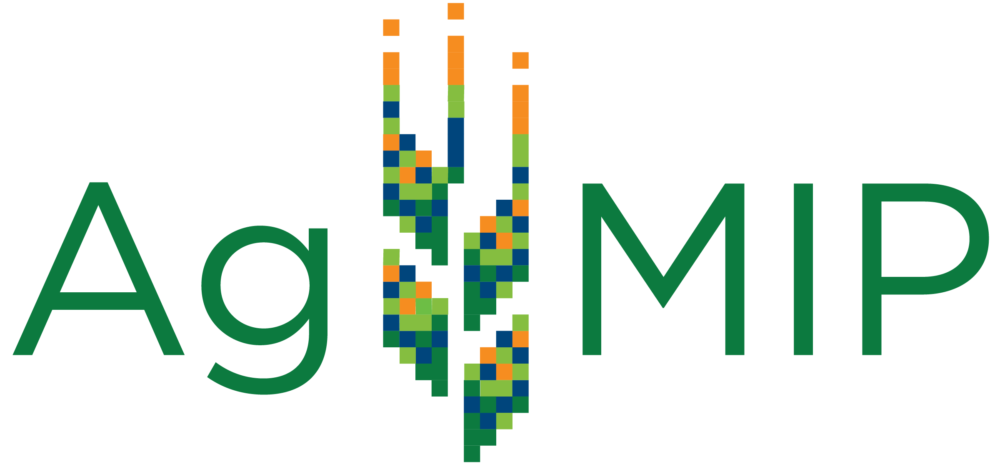SUMMARY PROGRAM ABSTRACTS SPONSORS PRESENTATIONS
Updated June 21, 2016
|
Tues. June 28 |
|
|||
|
8:00 – 9:00 |
Check in and packet pick up |
|||
|
9:00 – 9:30 |
Introduction from AgMIP Steering Council Co-Chair – Jean-Francois Soussana |
|||
|
9:30 – 10:00 |
Introduction from AgMIP Steering Council Co-Chair – Ghassem Asrar |
|||
|
10:00 – 10:30 |
Coffee Break |
|||
|
10:30 – 12:00 |
Plenary: Coordinated Global and Regional Assessments (CGRA) Assessment protocols; |
|||
|
12:15 – 12:30 |
Group Workshop Photo |
|||
|
12:30 – 2:00 |
Buffet Lunch |
|||
|
2:00 – 3:30 |
Parallel Session 1: Four concurrent |
|||
|
|
1.1 Seasonal Forecasts |
1.2 Crop Model Improvement |
1.3 Developing |
1.4 Climate Change |
|
2:00 |
Past |
Inter-comparison |
Developing |
Regional |
|
2:15 |
Dynamic |
Lessons |
Designing |
Impacts |
|
2:30 |
Interdisciplinary |
Who |
Exploring |
An |
|
2:45
|
Forecasting |
Global |
Integrated |
Towards a 21st Century Climate Service for small-holder farmers in Zimbabwe: Definition of the climate problem |
|
3:00 |
Integrated |
The |
Developing |
Economic |
|
3:15 |
Multiple |
Parameterization |
Incremental |
Management |
|
3:30 – 4:00 |
Coffee Break |
|||
|
4:00 – 5:00 |
Parallel Session 1 Continued: Four concurrent |
|||
|
|
1.5 Stakeholders and |
1.6 Remote Sensing, |
1.7 Wheat Model |
1.8 Livestock and |
|
4:00 |
EUROCLIMA |
Soil |
Improved –Enli Wang |
Large |
|
4:15 |
Impact |
The |
Prediction |
Impact |
|
4:30 |
Nation-wide |
Integrated |
Designing |
(CANCELLED) Modeling nitrogen dynamics including leaching in intensive crop rotations on productive organic-sandy soils after the break-up of grassland |
|
4:45 |
Co-production |
Using |
Model |
Assessing |
|
5:00 – 6:00 |
Afternoon Plenary Session: Co-Developed |
|||
|
6:00 – 7:00 |
Poster Session |
|||
|
7:00 – 8:00 |
Reception Dinner |
|||
|
Wednesday June 29 |
|
|||
|
8:30 – 9:30 |
Morning Plenary 1: Modeling for |
|||
|
9:30 – 10:30 |
Morning Plenary 2: Next-generation Tools and Open Data open, |
|||
|
10:30 – 11:00 |
Coffee Break |
|||
|
11:00 – 12:30 |
Parallel Session 2: Four concurrent sessions organized of15 min |
|||
|
|
Session 2.1 – Scenarios |
Session 2.2 – Nutrition |
Session 2.3 – |
Session 2.4 – Soils and |
|
11:00 |
Developing – Nataraja Subash |
Developing – Shauna Downs |
What |
Accounting |
|
11:15 |
Development |
Global |
Climate |
Soil/land |
|
11:30 |
Developing |
Food |
Sensitivity |
Pathways |
|
11:45 |
Representative |
Interactions |
Wheat |
Impacts |
|
12:00 |
New |
An |
Towards |
Modeling |
|
12:15 |
Process |
Discussion |
Making climate data useful for decision makers at the local scale: the case of Nkayi district, Zimbabwe – Olivier Crespo |
Soil organic matter and sensitivity to climate change. Can we disentangle correlation and causation? |
|
12:30– 2:00 |
Buffet Lunch – self organized groups |
|||
|
2:00 – 3:30 |
Parallel Session 2 Continued: Four concurrent sessions organized of 15 min oral presentations. |
|||
|
|
Session 2.5 – Crop |
Session 2.6 – Global |
Session 2.7 – Regional |
Technologies and Data |
|
2:00 |
Toward |
From |
Climate |
An |
|
2:15 |
High-throughput |
Climate |
Reducing |
The |
|
2:30 |
A basic approach to predicting yields and optimizing inputs using artificial |
Dynamic |
(Cancelled) Impact of climate change on irrigated maize in Tamil Nadu, Southern India – Vellingiri |
Enhancing |
|
2:45 |
Importance of crop management for simulating crop phenology in large scale impact |
Intensification |
Assessment |
DataMill: |
|
3:00 |
Assessing agricultural practices in highly variable environments: SARRA-H spatialized crop model for West Africa |
Alternative |
Evaluating |
Interlinked |
|
3:15 |
Improved |
A |
Future Climate Change and Its Effect on Maize Yields in Selected Semi-arid Areas of Southern Africa |
Application |
|
3:30 – 4:00 |
Coffee Break |
|||
|
4:00 – 5:00 |
Afternoon Plenary: Toward multi-national |
|||
|
5:00 – 6:30 |
Poster viewing with beverage refreshment |
|||
|
Thursday June 30 |
|
|
|
9:00 – 10:30 |
Morning Plenary: Observations and Recommendations in Planning |
|
|
10:30 – 11:00 |
Coffee Break |
|
|
11:00 – 12:30 |
Session 3: Regional Breakout Groups – regional |
|
|
3.1 South Asia |
3.5 East Asia/Oceania |
|
|
3.2 Sub-Saharan Africa |
3.6 Europe |
|
|
3.3 Latin America and Caribbean |
3.7 Global Agriculture |
|
|
3.4 North America |
3.8 Global Economics |
|
|
12:30 – 2:00 |
Buffet Lunch – self organized groups |
|
|
2:00 – 4:00 |
Work Group Breakouts |
|
|
4.1 Global Economics |
4.6 Data, Decision Support Systems and IT |
|
|
4.2 AgGRID |
4.7 Crop Modeling of Low-Input Smallholder Systems |
|
|
4.3 Seasonal Estimates, Data Assimilation, and Climate Shocks |
4.8 Sustainable Nutrition Security |
|
|
4.4 Regional Integrated Assessments |
4.9 Crop-Water-ET |
|
|
4.5 Crop Model Intercomparison and Improvement (various groups) |
4.10 Livestock-Grasslands |
|
|
4:00 – 4:30 |
Coffee Break |
|
|
4:30 – 5:00 |
Plenary: Highlights from Regional and Working Team Breakouts |
|
|
5:00 – 6:00 |
Synthesis and Wrap-up |
|



